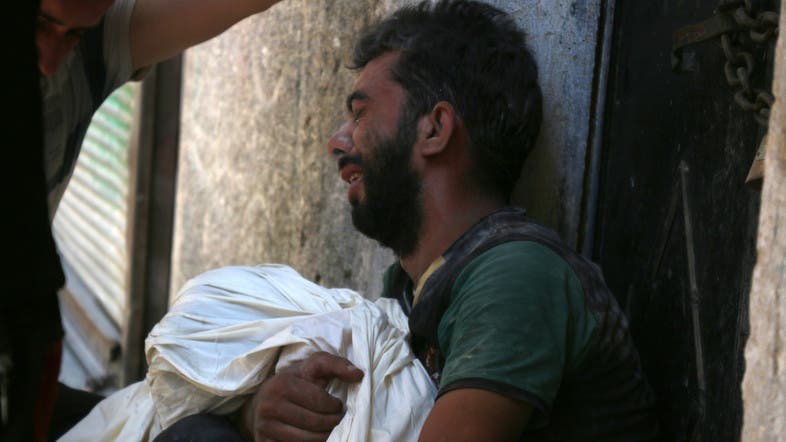
Tomorrow, the civilised people of the world will mark Syrian Genocide Memorial Day. I hope that you will be among them. In the future, I expect many people will be guilt-tripped into marking this day. Schoolchildren will be forced to remember the facts, to look at the pictures, to wonder how we can have been so callous to watch a people massacred before our eyes.
It is three years since Bashar al-Assad fired rockets full of sarin gas into two rebel-held neighbourhoods of Damascus. 1500 people died, many of them children, because they were sleeping on the ground floor of their homes for fear they would not survive a bomb attack by Assad on the upper floors. It is the worst single massacre of this century.
It is three years since Bashar al-Assad fired rockets full of sarin gas into two rebel-held neighbourhoods of Damascus. 1500 people died, many of them children, because they were sleeping on the ground floor of their homes for fear they would not survive a bomb attack by Assad on the upper floors. It is the worst single massacre of this century.
Someone asked on TV the other day, as Assad continues day-by-day to attack defenceless people with chlorine gas, why we are more concerned about death by chemical weapons than other sorts of murder. In a better world we wouldn't be. But it is one of the worst excesses of criminal war fighting, an identifiable weapon that cannot be used discriminately, and something any just world must have prohibitions against.
This was also why it was President Obama's alibi for doing nothing to protect the Syrian people. In 2012 he declared it was a red line if Assad used a whole bunch of chemical weapons, presumably thinking that Assad would use all other methods to kill people, and he would be off the hook. But Assad's rule is never going to be stable again, and every time his grip on power is threatened, he needs to up the ante, to make people scared that this would turn into a confrontation between him and the United States. So he used a whole bunch of chemical weapons, and President Obama did nothing.
And the use of chemical weapons were the occasion for the greatest lie of the century, that it wasn't Assad, but the rebels who used chemical weapons. There has grown up a media industry, some for the political benefit of Russia and Iran, some seemingly for the smug contrariness, that went into overdrive to cast doubt upon the victims of these chemical attacks. The same sort of invention as Holocaust denial, the creation of spurious doubt, the invention of alternative scenarios, the deliberate ignorance of what the victims had to say, but rather being the province of just a few fascist cranks, widespread among those who think themselves in some way progressive. Along with a constant stream of other lies about the Syrian revolution, that it is a NATO invasion, that it is all for Israel's benefit, that the rebels are the same as ISIS and are just as bad, and so on. These lies will come back to haunt us.
There is a article in the Daily Mail three days ago, with an appropriately hysterical headline, "Former prisoners held in Assad's Syrian jails reveal how guards made the men rape one another to avoid execution… and regularly tortured or beat them to death".* Only it isn't hysteria, it's the truth. And when nobody has an interest in covering for Assad's crimes, when no-one has an interest in pretending the real crime would be to try and stop it, they will look for everyone on the left who said we should be Pharisees rather than Good Samaritans. And every word uttered by those left wing politicians who said the real problem was the rebels and our funding of them, will be used as evidence that the left are in love with genocidal dictatorship, and even those of us who have stood in solidarity will not escape the backlash.
Please mark Syrian Genocide Memorial Day tomorrow. Please do not share articles by genocide deniers like Sam Kriss, Tariq Ali and Ray McGovern, just to mention a few I have seen recently. Please support those who would propose action that would stop Assad committing genocide, and oppose those who do not. And then you can tell kids in the future that you stood against Assad's genocide when it counted, while it was still going on, and while there were people who could be saved.
*[https://www.dailymail.co.uk/news/article-3744052/Former-prisoners-held-Assad-s-Syrian-jails-reveal-guards-men-rape-one-avoid-execution-regularly-tortured-beat-death.html]




